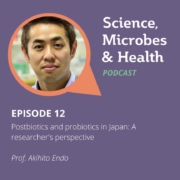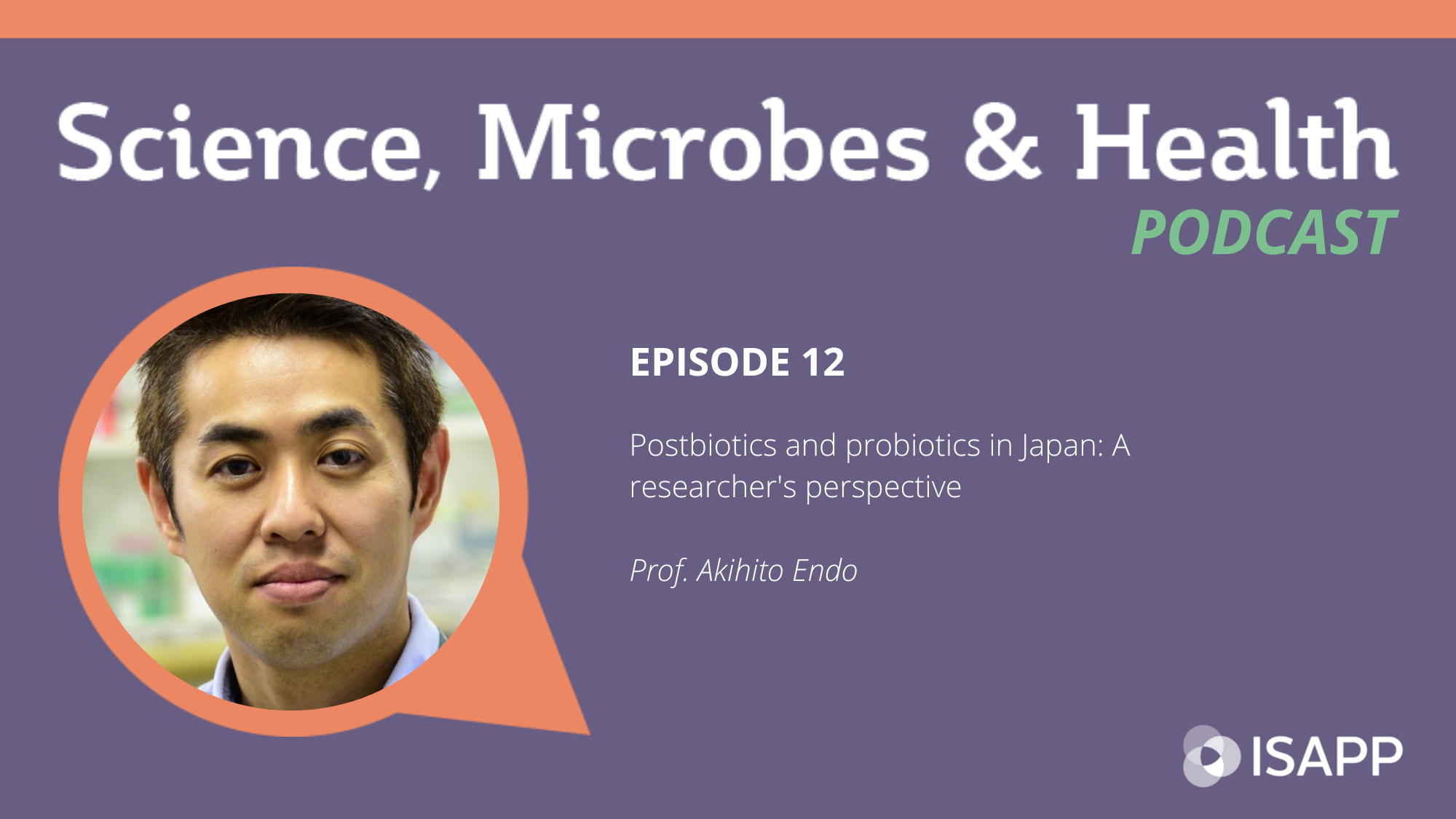Episode 12: Postbiotics and probiotics in Japan: A researcher’s perspective
Podcast: Play in new window | Download
Subscribe: Apple Podcasts | Spotify | RSS
The Science, Microbes & Health Podcast
This podcast covers emerging topics and challenges in the science of probiotics, prebiotics, synbiotics, postbiotics and fermented foods. This is the podcast of The International Scientific Association for Probiotics and Prebiotic (ISAPP), a nonprofit scientific organization dedicated to advancing the science of these fields.
Postbiotics and probiotics in Japan: A researcher’s perspective, with Prof. Akihito Endo
Episode summary:
In this episode, ISAPP podcast host Dan Tancredi talks with food microbiologist Prof. Akihito Endo from Tokyo University of Agriculture in Japan, who was an author on the published ISAPP scientific consensus definition of postbiotics. Endo describes the unique properties of fructophilic lactic acid bacteria, and talks about the landscape of probiotic and postbiotic products in Japan.
Key topics from this episode:
- Prof. Tomotari Mitsuoka originally introduced the concept of probiotics, prebiotics, and “biogenics” in Japan – the latter are similar to postbiotics.
- Japan is a leading country in postbiotic applications, with many companies actively producing postbiotic products with killed bacterial cells.
- Endo has done research on fructophilic lactic acid bacteria (FLAB), which favor fructose instead of glucose; they are found in flowers, fruits, fermented foods, and honeybee guts.
- Novel species of FLAB have been discovered recently, and Endo found novel bacteriocin-producing FLAB. The bacteroicins may be active against pathogens.
- Dead cells of FLAB are present in fermented foods so they have a history of safe consumption. There is one postbiotic product with FLAB in Japan at present.
- Endo tested fresh honey and found it has viable FLAB. After 2 weeks they die because of antimicrobials present in honey. But there’s a safe consumption history even of the viable cells, albeit at low levels. He is interested in exploring them as probiotics in food products.
- The Japanese regulatory environment has two health claim systems for ‘biotics’: FOSHU, FFC. FOSHU is more restricted, while FFC can have more diverse health claims.
- A large variety of postbiotic products are available in Japan.
- One mechanism by which FLAB confer health benefits is through IgA induction (i.e. influencing immune activity).
Episode abbreviations and links:
Mitsuoka T. 1998. Functional Food: Probiotics, Prebiotics, Biogenics. Intestinal Flora and Probiotics.
Mitsuoka. 2011. History and Evolution of Probiotics. Japanese Journal of Lactic Acid Bacteria.
Background on fructophilic lactic acid bacteria: Are fructophilic lactic acid bacteria (FLAB) beneficial to humans?
Viable fructophilic lactic acid bacteria present in honeybee-based food products
Japanese categories for health benefit claims on foods (for more details, see ISAPP consensus statement):
- FOSHU – Food for Specialized Health Use
- FFC – Food with Functional Claims
On Kikunae Ikeda’s discovery of umami: Glutamate: from discovery as a food flavor to role as a basic taste (umami)
Additional resources:
Behind the publication: Understanding ISAPP’s new scientific consensus definition of postbiotics. ISAPP blog
Postbiotics. ISAPP infographic
What is a postbiotic? ISAPP video
About Prof. Aki Endo:
Akihito Endo is a research professor at Department of Nutritional Science and Food Safety, Faculty of Applied Bioscience, Tokyo University of Agriculture, Japan. He obtained a PhD degree of Fermentation Science with a topic on Lactic Acid Bacterial Diversity during Shochu Fermentation at Tokyo University of Agriculture in 2005. After he studied as a postdoc in Stellenbosch University (South Africa) and in University of Turku (Finland), he started to work in Tokyo University of Agriculture in 2013. His research themes are ecology and food application of fructophilic lactic acid bacteria and oligosaccharide metabolism in human gut anaerobes. He is a member of Subcommittee on the taxonomy of Bifidobacterium, Lactobacillus and related organisms, International Committee on Systematics of Prokaryotes since 2011 and a board member of Japanese Society for Lactic Acid Bacteria since 2021.






